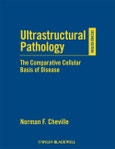Table of Contents
Preface xi
Contributors xiii
Prologue xv
Part I: Structural Basis of Cell Injury 3
1 Response to Cellular Injury 5
Acute Cell Swelling 5
Adaptive Responses to Persistent Injury 21
2 Cell Death 33
Necrosis 35
Programmed Cell Death 40
Interplay of Necrosis and PCD 49
Getting Rid of the Dead Cell 52
Endothelial Cell Death 54
3 Cellular Defense and Recovery 61
Plasma Membrane in Recovery 61
Detoxification: Smooth Endoplasmic Reticulum and Peroxisomes 62
Mitochondria in Recovery 63
Nucleoli, DNA, and the Genome in Recovery 64
Proteostasis 67
Autophagy: Removal of Debris 69
Part II: Organelle Pathology 75
4 The Cell Surface 77
The Plasma Membrane 77
Cytoskeleton 86
Intercellular Junctions 97
Surface Structures 101
5 Intracellular Trafficking 109
Endocytosis 109
Phagocytosis 115
Lysosomes and Cytoplasmic Trafficking 116
Exocytosis 118
6 Nucleus, Ribosomes, the Golgi Complex, and Secretion 125
Nucleus 125
Ribosomes 136
Rough Endoplasmic Reticulum 138
Golgi Complex 139
Secretion 142
7 Peroxisomes, Smooth Endoplasmic Reticulum, and Lipids 153
Peroxisomes 153
Smooth Endoplasmic Reticulum 156
Glycogen 161
Lipids 164
Lipoproteins 169
Lipid Metabolism Disorders 173
8 Mitochondria 181
The Normal Mitochondrion 181
Mitochondrial Swelling: Response to Acute Injury 184
Mitochondriopathy of Metabolic and Chronic Diseases 188
Mitochondrial DNA-Based Disorders 193
Part III: Inflammation and Hemostasis 199
9 Endothelium 201
Endothelial Interface with Blood and Perivascular Space 201
Endothelial Thromboresistance vs. Procoagulation 206
Endothelial Response to Hypoxia and Circulatory Dysfunction 208
Inflammation 209
Mast Cell and Basophil Interface with Endothelium 217
Angiogenesis 223
10 Leukocytes and Platelets 231
The Neutrophil 231
Eosinophils 243
Platelets 246
Thrombosis 257
11 The Mononuclear Phagocyte System and Lymphocytes 269
The Monocyte-Macrophage System 269
Dendritic Cells 274
Lymphocytes 283
12 The Extracellular Matrix 295
Collagen Fibers 297
Microfibrils 303
Extracellular Ground Substance 304
Basement Membranes 307
Mucins and Other Barriers 310
Part IV: Infectious Diseases 317
13 Cytopathology of Viral Diseases 319
Family Poxviridae 319
Family Herpesviridae 327
Family Adenoviridae 338
Family Papillomaviridae 343
Family Polyomaviridae 347
Family Parvoviridae 349
Family Iridoviridae 353
Family Asfarviridae 353
Family Hepadnaviridae 354
Family Circoviridae 355
Family Orthomyxoviridae 356
Family Paramyxoviridae 358
Family Rhabdoviridae 366
Family Filoviridae 369
Family Coronaviridae 370
Family Reoviridae 373
Family Arenaviridae 379
Family Togaviridae 381
Family Arteriviridae 384
Family Bornaviridae 386
Family Flaviviridae 386
Family Bunyaviridae 391
Family Birnaviridae 392
Family Nadoviridae 394
Family Picornaviridae 394
Family Caliciviridae 399
Family Astroviridae 401
Family Retroviridae 401
14 Cytopathology of Pathogenic Prokaryotes 425
Structure of the Bacterial Cell 425
Phylum Tenericutes, Order Mycoplasmatales 442
Order Entomoplasmatales 447
Order Incertae Sedis 447
Phylum Proteobacteriae, Order Rickettsiales 448
Order Rhizobiales 453
Order Burkholderiales 457
Order Neisseriales 459
Order Campylobacterales 461
Order Aeromonadales 466
Order Enterobacteriales 466
Order Legionellales 476
Order Pasteurellales 477
Order Pseudomonadales 482
Order Thiotricales 484
Order Vibrionales 484
Phylum Chlamydiae, Order Chlamydiales 485
Order Actinomycetales 487
Phylum Firmicutes, Order Bacillales 496
Order Lactobacillales 500
Order Clostridiales 502
Order Spriochaetales 505
Order Bacteroidales 509
Order Fusobacteriales 510
Other Bacteria 510
15 Pathogenic Protozoa 525
Amoebas 526
Ciliates 528
Flagellates 529
Hemosporidians 538
The Malarial Organisms 543
The Coccidia 549
The Microsporans 560
Protozoa of Uncertain Taxonomy 563
16 Algae, Fungi, and Other Eukaryotes 573
Algae 573
Fungi 576
The Myxozoans 595
Intracelllar Metazoan Parasites 597
Part V: Toxicologic Diseases 605
17 Toxicologic Pathology 607
Lysosomotropic Hepatotoxins 609
Rough Endoplasmic Reticulum Hepatotoxins 613
Hepatotoxins and the Golgi Complex 619
Smooth Endoplasmic Reticulum and Hepatotoxicity 619
Mitochondrial Hepatotoxins 623
Steatosis and Hepatotoxicity 626
Hepatic Toxins That Act on the Nucleus 626
Hepatocyte Toxins That Act on the Cytoskeleton 627
Particulate Hepatotoxins 627
18 Myotoxins 635
Cardiotoxicity 635
Myocardial Toxins 643
Skeletal Muscle 651
Smooth Muscle Toxicity 658
19 Neurotoxins and Neurodegeneration 667
Introduction 667
Neuronopathies 668
Myelin Toxins: Myelinopathies 678
Neuropathies: The Peripheral Nerves 681
Neurotoxins That Act at Nerve Termini and Synapses 683
Glial Toxins 687
Vascular Neurotoxins and the Blood-Brain Barrier 688
20 Nephrotoxins 695
Glomerular Toxins 695
Proximal Convoluted Tubule Toxins 697
Distal Tubule Toxins 705
Toxins in the Medulla 705
The Juxtaglomerular Apparatus 708
Crystal Nephropathy 710
Confounding Lesions in Nephrotoxicity 711
21 Toxicity of Respiratory Systems 717
The Normal Mammalian Lung 717
Reaction to Pulmonary Toxins 719
Substances Damaging to Lung 723
Acute Toxic Pulmonary Injury 726
Chronic Inhalant Injury 728
Chronic Exhalant Toxicity 734
Comparative Respiratory Systems 736
Part VI: Pathologic Growth 741
22 The Cell Cycle: Dysfunction in Aging, Senescence, and Hibernation 743
The Cell Cycle 743
Regeneration 747
Aging and Senescence 750
Hibernation 751
Cell Senescence 752
23 The Neoplastic Cell 757
The Genomic Landscape 758
Benign or Malignant 761
Neoplastic Cell Structure 761
Neoplastic Cell Surfaces 763
The Nucleus of the Neoplastic Cell 766
Cytoplasm 769
The Tumor Microenvironment 775
Metastasis 780
Neoplastic Cell Death 785
Part VII: Diagnostic Pathology 795
24 Calcification 797
Intracellular Calcification 797
Extracellular Calcification 798
Microliths 802
25 Pigments 811
Melanin 811
Chromatophores 815
Hemoglobin-Derived Pigments 815
Erythrophagocytosis 817
Copper-Containing Pigments 822
Exogenous Pigments 824
26 Amyloid, Protein Misfolding Defects, and Inclusions 829
Amyloid 829
Tauopathies 839
Synucleinopathies 840
Misfolded Proteins and Inspissated Inclusions 842
27 Metabolic and Storage Diseases 857
Lipid Storage Diseases 857
Neuronal Ceroid Lipofuscinoses 862
Glycoproteinoses 863
Mucopolysaccharidoses 864
Mucolipidoses 866
Glycogen Storage Diseases 866
Amino Acid Transport Storage Diseases 869
Other Storage Diseases 870
28 Arteriopathy 875
Responses of the Artery to Injury 875
Atherosclerosis 881
29 The Renal Glomerulopathies 891
Membranous Glomerulonephritis 891
Proliferative Glomerulonephritis 898
Minimal Change Disease 900
Glomerulonephritis Associated with Systemic Disease 900
Diabetes 903
30 Prions 911
Prions Defi ned 911
The Transmissible Spongiform Encephalopathies 912
Index 917








